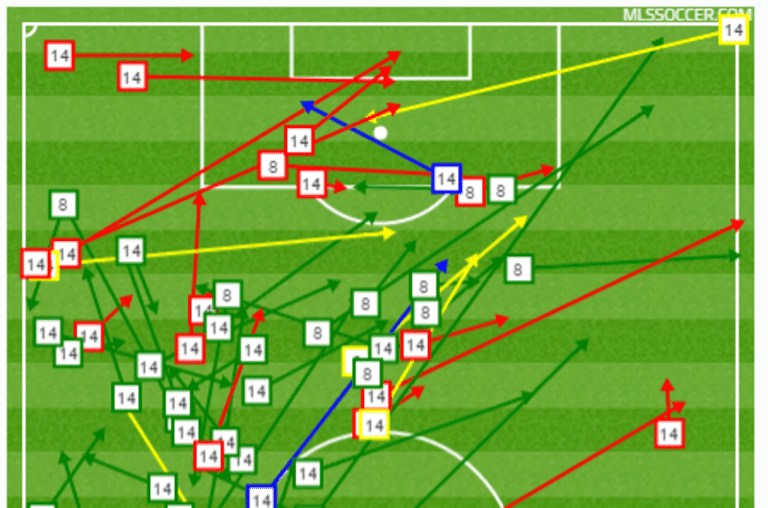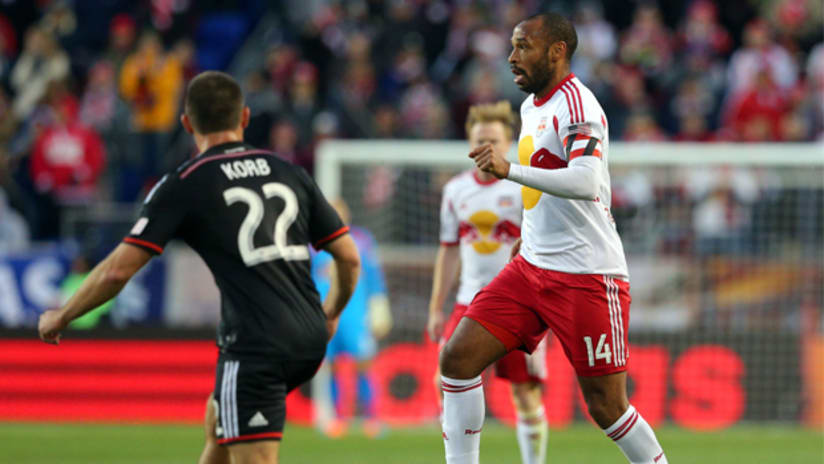I'm coming around on the away goals rule. I was against it for a long time, but given how exciting the first legs of this year's playoff series have been -- especially in comparison to last year's drab Leg 1 offerings -- I'm officially forced to reconsider my stance.
New York's 2-0 win over D.C. United on Sunday, for example, held more tension with D.C. attacking late than it otherwise would have. A 2-1 loss for them would have been a very, very acceptable result.
Here are three things I took from New York's win against their old foes in the 2014 MLS Cup Playoffs, presented by AT&T:
1. Hold left, attack right
There was one player that everyone knew would be targeted out there: D.C.'s second-year left back Taylor Kemp. He was matched up against New York winger Lloyd Sam all day, and he was given a torrid time.
That is not to say Kemp was bad, as for the most part he held his own. But he also required a bit more help than United really wanted to give, which ended up opening the game. The further to the right Sam dragged D.C. defenders, the fewer guys they had to put around Thierry Henry and Peguy Luyindula.
RBNY's idea was to use those guys as interchangeable focal points, dual eyes of the storm who would provide both combination play and the occasional final pass.
The left-to-right idea is strong with this team:

So the threat of Sam in isolation drags defenders away from Henry and Luyindula. Then, when one of those guys get the ball, the defenders have to scramble back toward them. That, in turn, leaves passing lanes to find Sam in good spots, and preferably on the run.
When it happens right, it looks something like this:
New York just had too many options.
2. Making the numbers game count
As I said in my preview, it's almost never United's plan to win the central midfield outright. They just want to have Davy Arnaud and Perry Kitchen lock it down as best they can, and hope that they're able to play other teams - even teams with more numbers in central midfield - to a relative standstill.
That happened for the first 20 minutes in this one, but then Mike Petke gave his fullbacks instructions to overlap. It nearly paid in the short term:
In the long term, it was the defining aspect of the game, and a good example of how everything in soccer is connected. Because Eckersley and Roy Miller were overlapping so high, that meant neither Chris Pontius nor Nick DeLeon could pinch inside to help out Arnaud and Kitchen. And that meant Arnaud and Kitchen not only had to deal with Dax McCarty and Eric Alexander, but also Luyindula dropping deep from his No. 10 role into more of a pure midfielder's position, and Henry coming inside from the left to own acres of land.
This, right here, is the argument against the 4-4-2 when playing against 4-2-3-1 or 4-3-3 teams. And since New York has switched to a 4-2-3-1 in early September, they've shut D.C. out for 180 minutes (today's game, and a 1-0 win on September 10).
I'm not saying Ben Olsen should throw the baby out with the bathwater, but he has to come up some sort of plan to handle New York's rotations in possession.
3. Strangling the attack
More "everything is connected!" for you: Because New York were so dominant in central midfield and so dangerous on the wings, Fabian Espindola and Eddie Johnson were left on an island. The few times they did get the ball after the first 20 minutes they were going 2-on-4.
There was zero support. Look at the disconnect between the central midfield and strikers:
Just as worrisome is how ineffective Pontius was wide on the left. You can see that he basically didn't combine with his forwards at all, which is a problem since he's got to be both creative and goal dangerous in D.C.'s scheme.
Things worked slightly better when Chris Rolfe came on for Pontius, but 1) that's after Henry and Luyindula came off for RBNY, who decided to protect their lead instead of going for the coup de grâce, and 2) Rolfe hadn't played in six weeks, so he probably can't go 90 in Leg 2.
There's a lot for Olsen & Co. to ponder over the next week. D.C.'s not quite dead yet, but after that loss, they've got their work cut out for them.








